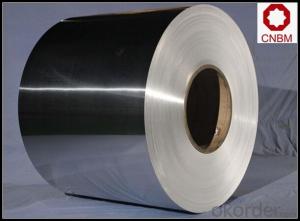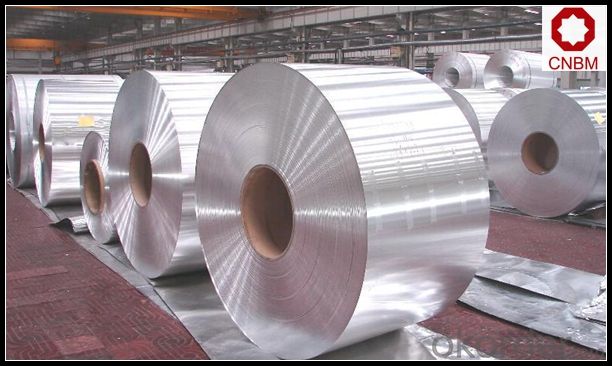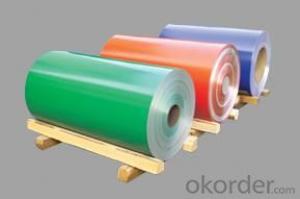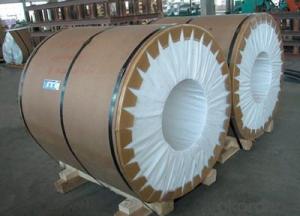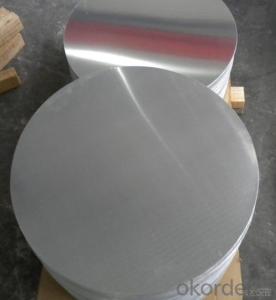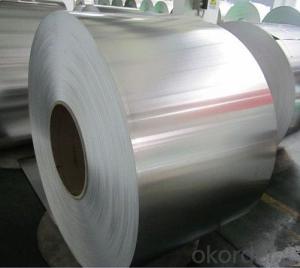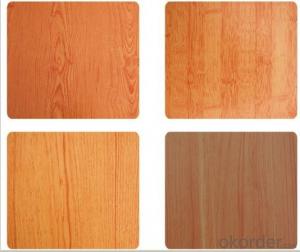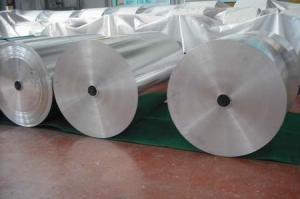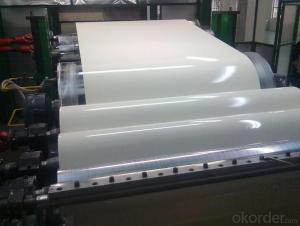China Pe Coated Aluminum Coil Stock for Aluminum Foil
- Loading Port:
- Shanghai
- Payment Terms:
- TT OR LC
- Min Order Qty:
- 5 m.t.
- Supply Capability:
- 10000 m.t./month
OKorder Service Pledge
OKorder Financial Service
You Might Also Like
Specification
1. Specification of Aluminum Coil Stock used for Aluminum Foil
1) Alloy | 1050, 1060,1100, 3003 3004 3105 3A21 5005 5052 etc |
2) Temper | O/H12/H14/H1/H18/H32/H34/H36/H38//H111/H112/H116/H321/T6/T651/T3/T351 etc |
3) Thickness | 0.1mm to 6mm |
4) Width | 20mm to 3300mm |
5) Coil weight | 100kgs to 6 tons depends on actual requirement |
6) Core material | Aluminum or paper |
7) Coil Inner diameter | 75mm, 150mm, 200mm, 300mm, 405mm, 505mm or as required |
8) Protective film can be added
2. Application of Aluminum Coil Stock used for Aluminum Foil
(1).Interior: wall cladding, ceilings, bathrooms, kitchens and balconies, shutters, doors...
(2).Exterior: wall cladding, facades, roofing, canopies, tunnels,column covers , renovations...
(3).Advertisement: display platforms, signboards, fascia, shop fronts...
3. Feature of Aluminum Coil Stock used for Aluminum Foil
*Such coil is specially designed to replace aluminum ingot, due to the high export tax of aluminum ingot, the coil has better price than ingot.
*This type of coil can fit customer's remelting furnace just like ingot, no need to make any change to the production line that was previously used for ingot. The standard coil size and weight is very suitable for the feed gate of furnace.
*This type of coil causes less material wastage than ingot when remelted.
*Our coil is made directly from ore, no need to go though the ingot making process, quality is much better than other suppliers who use ingot scrap to make coil.
Be free from Oil Stain, Dent, Inclusion, Scratches, Stain, Oxide Dicoloration, Breaks, Corrosion, Roll Marks, Dirt Streaks and other defect which will interfere with use
4. Certificate:
SGS and ROHS(if client request, paid by client), MTC(plant provided), Certificate of Origin(FORM A, FORM E, CO), Bureau Veritas and SGS (if client request, paid by client), CIQS certificate
5. Image of Aluminum Coil Stock used for Aluminum Foil
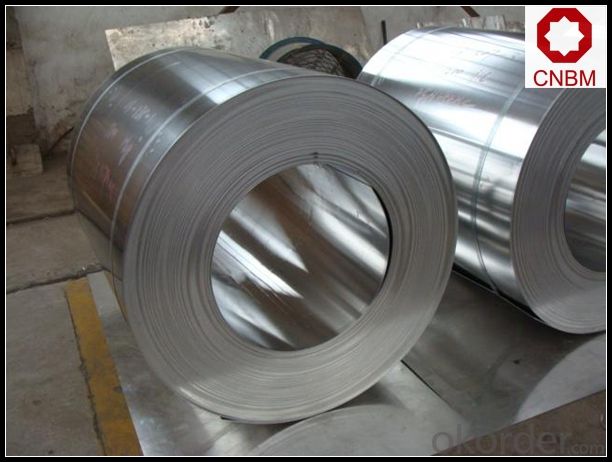
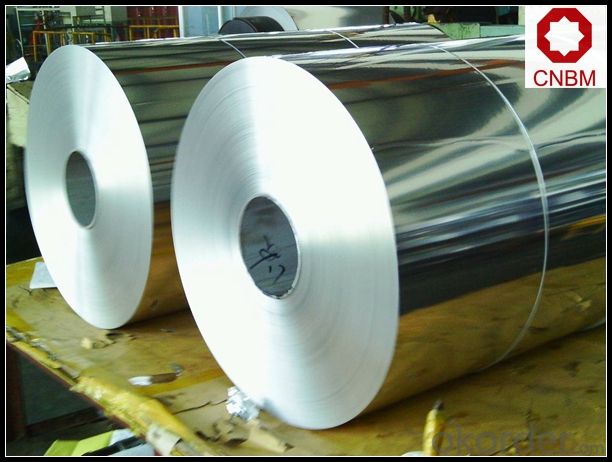
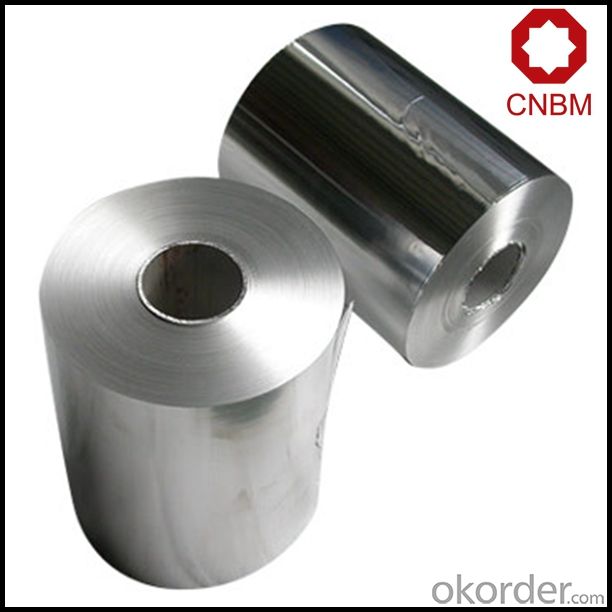
6. Package and shipping of Aluminum Coil Stock used for Aluminum Foil
eye to wall
eye to the wall
with wood pallet (wooded case also available)
7. FAQ of
1) What is the delivery time?
Dpends on actual order, around 20 to 35 days
2)What is the QC system:
We have QC staff of 20 persons and advanced equipment, each production is with MTC traced from Aluminum ingot lot.
3) What market do you mainly sell to?
Australia, America, Asia, Middle East, Western Europe, Africa etc
- Q: How to sell the super hard 5083aluminum alloy and 5083 aluminum coil?
- Among the alloy which cannot endure heat treatment, 5083 aluminum alloy, a kind of high magnesium alloy, has the properties of intensity, machinability, anti-corrosion, electric-arc weldability and aesthetic after anodizing. The main element of 5083 alloy being magnesium, it is endowed with corrosion resistance, weldablility and moderate intensity, thus applicable to maritime areas such as ships, and cars, airplane weldments, metro light rail, and pressure vessel (such as liquid tank truck, refrigerated truck, refrigerated container), refrigerating equipment, television tower, drilling equipment, transport facility, missile parts, armor and so on.
- Q: How do aluminum coils contribute to the sound insulation of buildings?
- Aluminum coils contribute to the sound insulation of buildings through their unique properties and applications. Aluminum is a lightweight and flexible material that can be easily formed into coils, making it an ideal choice for sound insulation purposes. One of the main ways aluminum coils contribute to sound insulation is by acting as a barrier to prevent the transmission of sound waves. When installed in walls, ceilings, or floors, these coils create an additional layer that helps to block and absorb sound energy. Aluminum has a high density and rigidity, which allows it to effectively reflect and absorb sound waves, reducing their intensity as they pass through the building structure. Moreover, aluminum coils can be combined with other soundproofing materials, such as foam or fiberglass, to enhance their sound absorption capabilities. These combinations provide a more comprehensive sound insulation system, as the different materials work together to trap and dampen sound waves. Another advantage of aluminum coils is their resistance to moisture and corrosion, which makes them suitable for both indoor and outdoor applications. This durability ensures that the sound insulation provided by aluminum coils remains effective over time, even in harsh environments. Additionally, aluminum coils are easy to install and maintain, making them a cost-effective solution for sound insulation in buildings. Their lightweight nature allows for easy transportation and handling, while their flexibility enables them to be installed in various positions and configurations. In summary, aluminum coils contribute to the sound insulation of buildings by acting as a barrier to sound transmission, reflecting and absorbing sound waves, and providing durability and versatility. Their combination with other soundproofing materials further enhances their effectiveness. With their lightweight and flexible properties, aluminum coils offer a practical and cost-effective solution to improve the acoustic performance of buildings.
- Q: If so why does an aluminum bend or get nicked or break quickly?
- It depends on how you set the criteria of comparison. If you go by volume, Aluminum isn't stronger. That's why a steel can is stronger than one of similar size and thickness. If you go by weight, aluminum is said to be stronger. Let's say we were looking to create a wall, spec'ed to a particular height and width, and just thick enough to hold back a given PSI of pressure. The aluminum one would have to be thicker to have the strength to hold back the pressure, but it'd be lighter than the steel equivalent. Also, the ease by which a material can be nicked isn't an indicator of strength but of hardness. Harder, isn't necessarily stronger.
- Q: What are the potential risks of using aluminum coils in specific applications?
- There are several potential risks associated with using aluminum coils in specific applications. Firstly, aluminum is a highly reactive metal and can undergo oxidation, leading to the formation of aluminum oxide. This oxide layer can be protective in some cases, but in certain environments, such as acidic or alkaline conditions, it can break down and result in corrosion of the aluminum coils. This corrosion can compromise the structural integrity of the coils and reduce their lifespan. Secondly, aluminum coils have relatively low strength compared to other metals, such as steel. This can make them susceptible to deformation or damage under heavy loads or high pressure conditions. In applications where the coils are exposed to significant mechanical stress, they may be more prone to bending or cracking, leading to potential failure. Furthermore, aluminum has a relatively low melting point compared to other metals, such as copper or iron. This means that in applications where the coils are subjected to high temperatures, such as in heating or cooling systems, there is a risk of the aluminum coils melting or deforming. This can result in system malfunctions, reduced efficiency, or even safety hazards. Another potential risk of using aluminum coils is related to their electrical conductivity. While aluminum is a good conductor of electricity, it has a higher resistance compared to copper. This can lead to increased power losses and reduced energy efficiency in electrical applications. Additionally, aluminum coils may also be more prone to electrical arcing or sparking, which can pose a fire hazard. Finally, it is worth mentioning that aluminum is a lightweight metal, which can be advantageous in certain applications. However, this also means that aluminum coils may have lower durability and resistance to physical impacts or external forces compared to heavier metals. In environments where the coils are exposed to vibrations, impacts, or other mechanical stresses, they may be more susceptible to damage or premature failure. Overall, while aluminum coils offer various benefits, including light weight, good thermal conductivity, and resistance to corrosion, it is important to carefully consider the potential risks associated with their use in specific applications. Proper design, maintenance, and compatibility with the operating conditions are crucial to mitigate these risks and ensure the safe and effective performance of aluminum coils.
- Q: What are the different grades of aluminum used in coils?
- There are several different grades of aluminum commonly used in coils, including 1100, 3003, 5052, and 6061. Each grade has its own unique characteristics and properties, making them suitable for different applications. For example, 1100 aluminum is known for its excellent corrosion resistance and high thermal conductivity, making it ideal for heat exchangers and fins. On the other hand, 5052 aluminum offers good formability and moderate strength, making it commonly used in automotive and marine applications. Lastly, 6061 aluminum is a versatile grade with excellent strength-to-weight ratio, making it suitable for structural components and aerospace applications.
- Q: Are aluminum coils suitable for low-maintenance roofing applications?
- Yes, aluminum coils are suitable for low-maintenance roofing applications. Aluminum is known for its durability, longevity, and resistance to corrosion, making it an ideal material for roofing. Aluminum coils are lightweight yet strong, providing excellent structural integrity to withstand various weather conditions. Additionally, aluminum is a low-maintenance material as it does not rust or require regular painting. This means that homeowners or building managers can save time and money on maintenance tasks such as repainting or replacing rusted parts. Overall, aluminum coils are an excellent choice for low-maintenance roofing applications.
- Q: Are aluminum coils resistant to UV rays?
- Generally, aluminum coils possess resistance against UV rays. Aluminum, being a non-reactive metal, does not easily corrode or react with other substances. This resistance to corrosion also extends to UV rays. UV rays are a type of radiation emitted by the sun and can cause gradual damage to various materials, including fading, discoloration, and degradation. However, aluminum is renowned for its ability to withstand UV rays without significant harm. Hence, aluminum coils are an appropriate option for outdoor applications that involve exposure to sunlight and UV rays, such as air conditioning systems, refrigeration units, and solar panels. Furthermore, aluminum coils can be coated with protective finishes or paints to further enhance their resistance to UV rays and prolong their lifespan.
- Q: Im doing an assignment for science and i need to know the nuclear charge of Aluminium?and also is there a difference between Aluminium and Aluminum or can it just be spelt differently?
- Aluminum by itself has no charge it is neutral. The number of electrons matches the number of protons. The electrons on aluminum move with ease, that is why it is used as a wire. If one of the electrons is lost it becomes a positive ion with a charge of +1. If the Aluminum has one more electron than protons then it is said to be a negative ion with a charge of -1. Gravity is the summation of all the attractive and repulsive forces in the location being considered. Gravity is when the attractive forces are stronger. Neutral gravity is when the attractive and repulsive forces match exactly. (very rare) Anti-Gravity is when the repulsive forces are stronger. Anti-gravity is quite common and is one of the primary causes for star formation in galaxies. Stars are actually secondary to the process. The Primary process is a quasar of mostly protons emerging like a bubble from a galactic core after splitting off from its neutrons deep in the galactic core. When the Quasar emerges the pressure is so greatly decreased that it explodes into about 50,000 stars. Proton proton repulsion in large objects, moons, planets, stars, quasars and galaxies are the prime example of anti-gravity in action
- Q: Are aluminum coils suitable for beverage can manufacturing?
- Yes, aluminum coils are suitable for beverage can manufacturing.
- Q: What are the necessary safety measures to be taken while handling and using aluminum coils?
- <p>When using aluminum coil, safety precautions include wearing appropriate personal protective equipment such as gloves and safety glasses to prevent cuts and eye injuries. Ensure good ventilation to avoid inhaling aluminum dust or fumes. Keep the work area clean and free from clutter to prevent tripping hazards. Use proper tools to handle the coils to avoid strain or injury. Be cautious of electrical hazards if the aluminum coil is being used in conjunction with electrical equipment. Always follow the manufacturer's guidelines for safe operation and storage of aluminum coils.</p>
Send your message to us
China Pe Coated Aluminum Coil Stock for Aluminum Foil
- Loading Port:
- Shanghai
- Payment Terms:
- TT OR LC
- Min Order Qty:
- 5 m.t.
- Supply Capability:
- 10000 m.t./month
OKorder Service Pledge
OKorder Financial Service
Similar products
Hot products
Hot Searches
Related keywords
